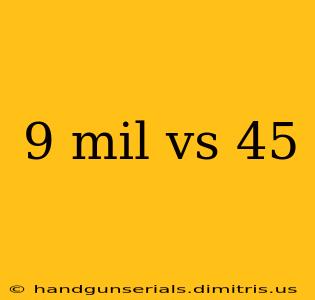Decoding the "9 Mil vs 45" Debate: A Deep Dive into Caliber Choice
The question of "9mm vs .45 ACP" is a perennial debate among firearm enthusiasts, self-defense experts, and law enforcement professionals. Both calibers have a long and storied history, boasting ardent supporters on either side. This article aims to provide a comprehensive and unbiased comparison, helping you understand the nuances of each and make an informed decision based on your specific needs and preferences.
Understanding the Basics:
Before diving into the specifics, let's establish a foundational understanding of both calibers:
-
9mm Parabellum (9x19mm): A common, relatively high-velocity cartridge known for its manageable recoil, higher magazine capacity, and relatively lower cost per round.
-
.45 ACP (Automatic Colt Pistol): A larger, lower-velocity cartridge renowned for its substantial stopping power, often cited as having a higher likelihood of incapacitating an attacker due to its larger diameter and mass.
Key Differences & Considerations:
Here's a breakdown of the key differences that often fuel the debate:
1. Stopping Power: The Myth of the "One-Shot Stop"
The .45 ACP is often touted for its superior stopping power. While it's true that a larger projectile delivers more kinetic energy, the reality of "one-shot stops" is far more complex. Factors like shot placement, the target's physiology, and the type of ammunition all play a significantly more crucial role than the caliber alone. Both 9mm and .45 ACP can be effective in self-defense situations, with proper training and shot placement being the ultimate determining factors.
2. Recoil & Shootability: Finding Your Comfort Zone
The 9mm generally exhibits less recoil than the .45 ACP. This makes it easier for many shooters, especially those new to firearms, to control and maintain accuracy during rapid fire. Reduced recoil translates to quicker follow-up shots, a critical advantage in self-defense scenarios. The .45 ACP, while manageable for experienced shooters, can be more challenging for beginners.
3. Magazine Capacity: Rounds on Target
9mm handguns typically offer significantly higher magazine capacities than their .45 ACP counterparts. This translates to more rounds available before needing a reload, a potentially life-saving advantage in a defensive situation.
4. Cost: A Factor to Consider
Generally, 9mm ammunition is less expensive than .45 ACP ammunition. This difference can be substantial over time, especially for those who practice regularly.
5. Penetration & Overpenetration: A Safety Concern
The higher velocity of the 9mm can lead to increased penetration, potentially posing a risk of overpenetration, particularly in densely populated areas. .45 ACP ammunition, while possessing significant stopping power, may offer slightly less penetration in some instances. Understanding your environment and the characteristics of your ammunition is paramount.
Conclusion: Choosing the Right Caliber for You
Ultimately, the "9mm vs .45 ACP" debate boils down to individual needs and preferences. There's no single "best" caliber. The 9mm offers advantages in shootability, capacity, and cost, while the .45 ACP boasts a reputation for greater stopping power. Thorough training, proper shot placement, and understanding the limitations of each caliber are far more critical than the caliber choice itself. Consult with experienced firearms instructors and consider your personal circumstances, training level, and intended use before making your decision. The right caliber is the one you can shoot accurately and effectively under pressure.

